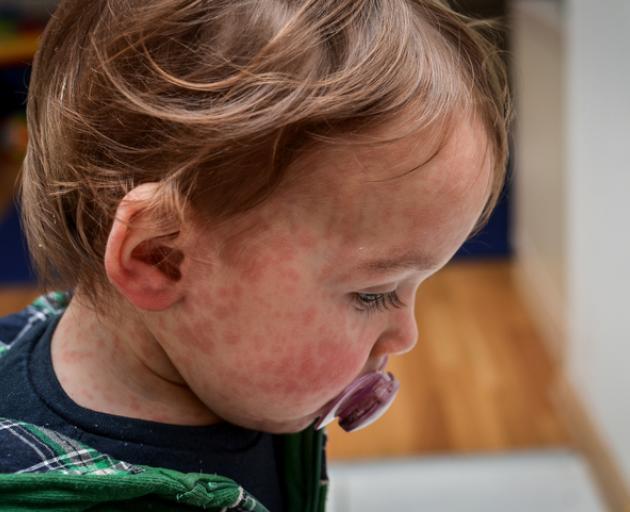Health
Measles Outbreak Sparks Urgent Health Advisory in New Zealand

Recent months have seen a notable surge in measles cases across Aotearoa, New Zealand. According to Health New Zealand’s public health medicine specialist, Dr. Sharon Sime, there may be undetected cases circulating within the community that are not linked to international travel. Measles, a highly contagious viral disease, poses significant risks, particularly to those who are unvaccinated.
Measles spreads easily, with up to 90 percent of non-immune individuals likely to contract the virus if exposed. Vaccination is critical in preventing outbreaks, and the measles vaccine is provided as part of the MMR vaccine (measles, mumps, and rubella). Currently, approximately 80 percent of New Zealand’s population is considered immune, a figure that falls short of the 95 percent vaccination coverage necessary to prevent outbreaks. Alarmingly, the vaccination rates for young children are even lower. As of December 2023, only 76.4 percent of two-year-olds had received full vaccination, with rates dropping to 63.3 percent for Māori infants and 70.4 percent for Pacific children.
Measles is recognized as one of the most infectious diseases, transmitted through respiratory droplets from coughs, sneezes, or even talking. The virus can remain airborne for hours after an infected person has left the area. Symptoms typically appear between seven to 18 days after exposure and include fever, cough, runny nose, and watery eyes. A characteristic blotchy rash usually develops approximately 14 days after exposure and can last up to a week. The disease is most contagious during the days leading up to and following the rash’s appearance.
Individuals with measles are advised to isolate themselves to prevent further transmission. The best defense against measles is receiving two doses of the MMR vaccine, available for free from family practices in New Zealand. Individuals considered immune include those who have received the two vaccine doses, previously contracted measles, or were born before 1969.
Complications from measles can affect up to 30 percent of cases, leading to conditions such as ear infections, pneumonia, seizures, and in rare instances, swelling of the brain, which can result in permanent damage. The risk of severe complications is notably higher among young children and malnourished individuals. The Centers for Disease Control and Prevention (CDC) reports a mortality rate of 0.1 to 0.2 percent during outbreaks, indicating that while fatalities are rare, they are a concerning possibility.
Globally, measles remains a major health issue, particularly in regions with low vaccination rates, such as parts of Africa and Asia. The World Health Organization (WHO) notes that before the introduction of the measles vaccine in 1963, the disease caused an estimated 2.6 million deaths annually worldwide. Although there has been a decrease in measles-related deaths—falling from 116,800 in 2022 to 107,500 in 2023—outbreaks continue to rise, with cases increasing by 20 percent globally over the past year.
As health officials in New Zealand work to mitigate the current outbreak, they emphasize the importance of vaccination and encourage anyone who suspects they have been exposed or are exhibiting symptoms to contact their general practitioner rather than visiting healthcare facilities directly. This approach helps minimize the risk of spreading the virus further.
The MMR vaccine is highly effective, providing 95 percent protection after two doses for individuals over one year old. A single dose offers 90 to 95 percent efficacy but is not sufficient for full immunity. The WHO recommends maintaining vaccination rates at 95 percent to prevent outbreaks.
Those who have received only one dose or are unsure of their vaccination status are encouraged to consult with their healthcare provider, as receiving an additional dose poses no harm. The vaccine is free for anyone under 18 years of age in New Zealand, regardless of immigration status, and is available to eligible adults as well.
As the situation evolves, public health officials are focused on increasing vaccination coverage and educating the community about the risks associated with measles. The urgency of this matter cannot be overstated, as the health implications of an outbreak extend beyond individual cases, impacting the broader population.
-

 World2 weeks ago
World2 weeks agoPrivate Funeral Held for Dean Field and His Three Children
-

 Top Stories2 weeks ago
Top Stories2 weeks agoFuneral Planned for Field Siblings After Tragic House Fire
-

 Sports3 months ago
Sports3 months agoNetball New Zealand Stands Down Dame Noeline Taurua for Series
-

 Entertainment3 months ago
Entertainment3 months agoTributes Pour In for Lachlan Rofe, Reality Star, Dead at 47
-

 Entertainment2 months ago
Entertainment2 months agoNew ‘Maverick’ Chaser Joins Beat the Chasers Season Finale
-

 Sports3 months ago
Sports3 months agoSilver Ferns Legend Laura Langman Criticizes Team’s Attitude
-

 Sports1 month ago
Sports1 month agoEli Katoa Rushed to Hospital After Sideline Incident During Match
-

 World3 weeks ago
World3 weeks agoInvestigation Underway in Tragic Sanson House Fire Involving Family
-

 Politics2 months ago
Politics2 months agoNetball NZ Calls for Respect Amid Dame Taurua’s Standoff
-

 Top Stories2 weeks ago
Top Stories2 weeks agoShock and Grief Follow Tragic Family Deaths in New Zealand
-

 Entertainment3 months ago
Entertainment3 months agoKhloe Kardashian Embraces Innovative Stem Cell Therapy in Mexico
-

 World4 months ago
World4 months agoPolice Arrest Multiple Individuals During Funeral for Zain Taikato-Fox

















